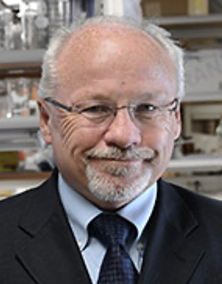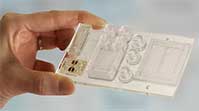CBM2 Developing New Technologies
Cancer patients often must undergo painful surgical biopsies to either diagnose their disease or determine the course of therapy following diagnosis. The Center of BioModular Multiscale Systems for Precision Medicine (CBM2) is developing new technologies that use Liquid Biopsies to make the diagnosis, treatment and monitoring for recurrence for all cancer patients less painful and more efficient than current practice.

CBM2, which recently moved to the University of Kansas (KU) with Prof. Steven A. Soper (Foundation Distinguished Professor and Center Director), is one of 27 nationally recognized Biotechnology Resource Centers supported by the National Institute of Biomedical Imaging and Bioengineering (NIBIB) at the National Institutes of Health (NIH). The mission of the Center is to design, manufacture and deliver new tools to the biomedical community for utilizing liquid biopsies for disease detection and management. Prof. Soper and his team direct their tools to enable Precision Medicine, which is a national initiative that seeks to tailor a treatment specifically for an individual patient. CBM2 technology, which requires a sample of blood to look for tumor cells or DNA from tumor cells, will allow doctors to effectively manage many cancer diseases as well as facilitate the delivery of new drugs. Other diseases, such as stroke and infectious diseases, can use their technologies as well.
With the move from the University of North Carolina to KU, the Center is kicking into high gear. They will move into the new state-of-the-art Integrated Science Building at KU in the summer of 2018 that will house a collection of high-tech scientific and engineering instruments to advance their research, as well as attract other top researchers from around the country to collaborate with the Center. The move to KU gives CBM2 the ability to work with other Kansas-based researchers, in particular those from the KU Medical Center, and the NCI designated KU Cancer Center, as well as those in Missouri, such as researchers/clinicians at Children’s Mercy Hospital. CBM2 is currently setting up a Liquid Biopsy Clinical Laboratory at KUMC (KU Cancer Center) to facilitate the care of cancer patients.

CBM2 consists of senior researchers from 4 universities: Prof. Steven A. Soper and Dr. Maggie Witek from KU, Prof. Francis Barany from Weill Cornell Medical College, Prof. Michael Murphy and Prof. Sunggook Park from Louisiana State University, and Prof. David Kaufman and Mr. Collin McKinney from the University of North Carolina. CBM2 researchers collaborate with scientists, doctors, and engineers from throughout the US. One such collaboration between Dr. Soper and Dr. Keith August of Children’s Mercy Hospital in Kansas City will use a new technology to allow for testing of pediatric patients with Acute Lymphoblastic Leukemia using a simple blood test that will lessen the need for invasive and painful bone marrow biopsies to screen for disease relapse in these children. The test will detect disease relapse much earlier than current standard laboratory tests. Another collaboration with Dr. Allison Baird of SUNY Downstate Medical Center, explores the use of a microfluidic device that can simultaneously test for different types of stroke using a blood sample that would give doctors key information on how to treat the patient more quickly and accurately. Current tests like CT scans and MRIs are time-intensive and may not immediately indicate the type of stroke a patient has had. Because the window for effective treatment of stroke is only about 4.5 hours, a quick diagnosis is crucial to patient outcome. Sampling of blood using the microfluidic device could result in a correct stroke diagnosis in just minutes, instead of hours. Microfluidic technologies consist of plastic chips, the size of a credit card, that can process whole blood and search for markers that can help diagnose diseases and also, determine the proper course of treatment. These devices are being produced in the laboratories of Center researchers using unique and specialized equipment that is found on the KU campus and will be consolidated within the Integrated Science Building.
Not only does the Center collaborate with researchers at top institutions across the country, it has also fostered several startup companies to make the Center’s technology commercially available. Startups include Digital NanoGenetics, Acuamark Diagnostics Inc., and BioFluidica Inc. BioFluidica’s Liquid Scan Technology searches a blood sample for disease-specific cells, and examines the recovered cells to accurately treat the disease.
NIBIB supports Biomedical Technology Resource Centers (BTRCs) that create critical and unique technology and methods at the forefront of their respective fields and apply them to a broad range of basic, translational and clinical research. This occurs through interactions of technical and biomedical expertise both within the Centers with other leading laboratories. Scientists and engineers at these Centers ensure that NIH-funded biomedical research projects may gain access to the newest and most advanced technologies, techniques, and methodologies.